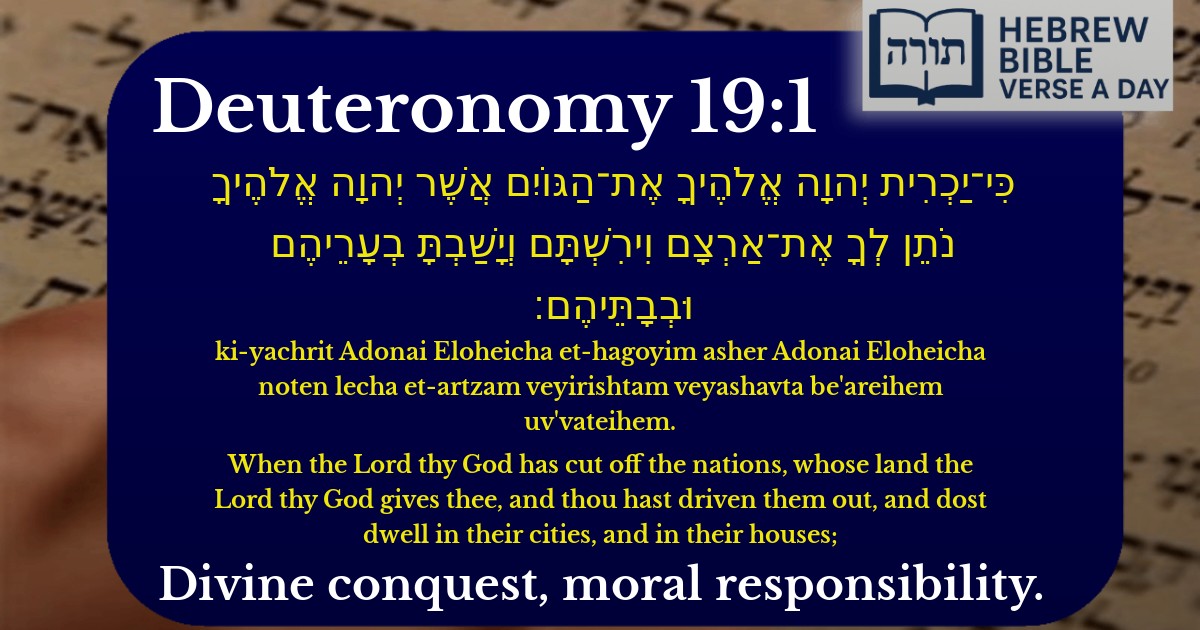Join Our Newsletter To Be Informed When New Videos Are Posted
Join the thousands of fellow Studends who rely on our videos to learn how to read the bible in Hebrew for free!
Hebrew Text
כִּי־יַכְרִית יְהוָה אֱלֹהֶיךָ אֶת־הַגּוֹיִם אֲשֶׁר יְהוָה אֱלֹהֶיךָ נֹתֵן לְךָ אֶת־אַרְצָם וִירִשְׁתָּם וְיָשַׁבְתָּ בְעָרֵיהֶם וּבְבָתֵּיהֶם׃
English Translation
When the Lord thy God has cut off the nations, whose land the Lord thy God gives thee, and thou hast driven them out, and dost dwell in their cities, and in their houses;
Transliteration
Ki-yachrit Adonai Eloheicha et-hagoyim asher Adonai Eloheicha noten lecha et-artzam veyirishtam veyashavta be'areihem uv'vateihem.
Hebrew Leining Text
כִּֽי־יַכְרִ֞ית יְהֹוָ֤ה אֱלֹהֶ֙יךָ֙ אֶת־הַגּוֹיִ֔ם אֲשֶׁר֙ יְהֹוָ֣ה אֱלֹהֶ֔יךָ נֹתֵ֥ן לְךָ֖ אֶת־אַרְצָ֑ם וִֽירִשְׁתָּ֕ם וְיָשַׁבְתָּ֥ בְעָרֵיהֶ֖ם וּבְבָתֵּיהֶֽם׃
Parasha Commentary
📚 Talmud Citations
This verse is quoted in the Talmud.
📖 Avodah Zarah 20a
The verse is referenced in a discussion about the prohibition of deriving benefit from idols and the land of the nations.
📖 Sotah 35b
The verse is cited in the context of the Israelites' conquest of Canaan and the divine command to dispossess the nations dwelling there.


Context in Deuteronomy
This verse appears in Devarim (Deuteronomy 19:1) as part of Moshe’s instructions to Bnei Yisrael regarding their future conquest and settlement of Eretz Canaan. The verse emphasizes Hashem’s role in dispossessing the nations and enabling Israel to inherit their land, cities, and homes.
Rashi’s Explanation
Rashi comments that the phrase "כי־יכרית ה' אלקיך את־הגוים" ("When the Lord thy God has cut off the nations") refers to the gradual process of conquest. He notes that Hashem did not command Israel to destroy all the nations at once, but rather in stages, as stated in Shemot (Exodus 23:30): "Little by little I will drive them out from before you." This ensured the land would not become desolate and overrun by wild animals before Bnei Yisrael could settle it.
Rambam’s Perspective
In Mishneh Torah (Hilchot Melachim 5:1), Rambam explains that the commandment to dispossess the Canaanite nations was conditional upon their refusal to accept the Seven Noahide Laws and make peace. If they had surrendered and accepted these basic moral laws, they would have been permitted to remain as tributaries. The verse underscores that the conquest was not arbitrary but a divine judgment against corrupt nations.
Midrashic Insights
Halachic Implications
The Sefer HaChinuch (Mitzvah 425) connects this verse to the broader mitzvah of settling Eretz Yisrael. The inheritance of the land is not merely a historical event but an ongoing obligation to establish Jewish sovereignty and build a society based on Torah values. The verse serves as a reminder that dwelling securely in the land is contingent upon faithfulness to Hashem’s commandments.